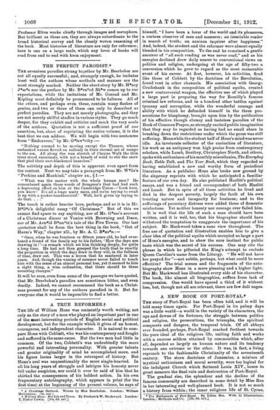THE PERFECT PARODIST.*
THE seventeen parodies strung together by Mr. Beerbohm are not all equally successful ; and, strangely enough, he imitates least well the authors whose methods and manner are the most strongly marked. Neither the short story by Mr. H*nry J*res nor the preface by Mr. B*rn*rd Sh*w comes up to our expectations, while the imitations of Mr. Conrad and Mr. Kipling must definitely be pronounced to be failures. All of the others, and perhaps even these, contain many flashes of
genius, and two or three of them can only be described as perfect parodies. They are not merely photographs, and they are not merely skilful studies in various styles. They go much deeper, for they exhibit and criticize and mock the very souls of the authors. Quotation is not a sufficient proof of our assertion, but, short of reprinting the entire volume, it is the best that we can adduce. We will begin with two sentences from "Endeavour," by Mr. G*1sw*rthy
"Nothing seemed to be moving except the Thames, whose embanked waters flowed on sullenly in their eternal act of escape to the sea. All along the wan stretch of Cheyne Walk the thin trees stood exanimate, with not a breath of wind to stir the snow that'pied their soot-blackened branches."
The subtlety and depth of this is apparent even apart from the context. Next we may take a paragraph from Mr. W*11s's "Perkins and Mankind," chapter xx., §1
" What was the matter with the whole human race ? He remembered again those words of Scragson's that had had such a depressing effect on him at the Cambridge Union—' Look here, you know! It's all a huge nasty mess, and we're trying to swab it up with a pocket-handkerchief.' Well, he'd given up trying to do that. . . ."
The touch is rather heavier here, perhaps, and so it is in Mr.
B*11*e's delightful essay "Of Christmas." But of this we cannot find space to say anything, nor of Mr. G*sse's account of a Christmas dinner at Venice with Browning and Ibsen, nor of Mr. Arn*ld B*nn*tt's tale of the Five Towns. Our last quotation shall be from the best thing in the book, " Out of Harm's Way," chapter xlii., by Mr. A. C. Bins*n :—
" Once, when he was fourteen or fifteen years old, he had over- heard a friend of the family say to his father, How the days are drawing in ! '—a remark which set him thinking deeply, for quite a long time. He had not then grasped the truth that in exactly the proportion in which the days draw in they will, in the fullness of time, draw out. This was a lesson that he mastered in later years. And, though the waning of summer never failed to touch him with the sense of an almost personal loss, yet it seemed to him a right thing, a wise ordination, that there should be these recurring changes."
It will be seen, even from some of the passages we have quoted, that Mr. Beerbohm's parodies are sometimes bitter, and even deadly. Indeed, we cannot recommend the book as a Christ- mas present for any of the authors parodied in it. But for everyone else it would be impossible to find a better.










































 Previous page
Previous page